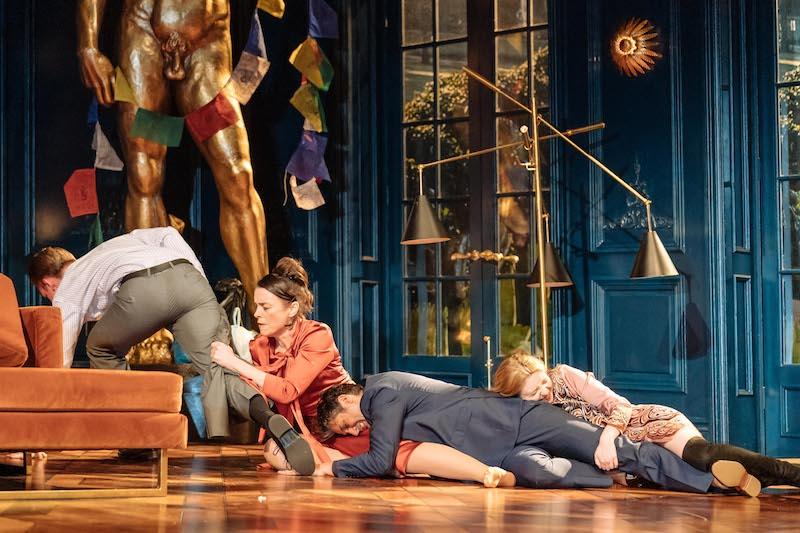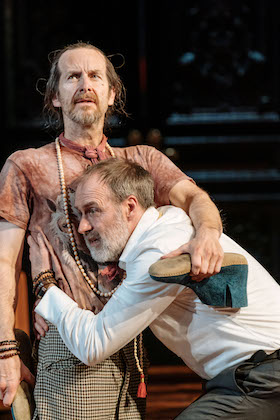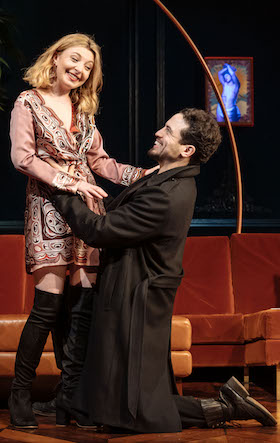Tartuffe, National Theatre review - morality-heavy version of the comedy classic | reviews, news & interviews
Tartuffe, National Theatre review - morality-heavy version of the comedy classic
Tartuffe, National Theatre review - morality-heavy version of the comedy classic
Brexit provides an unwelcome motor for John Donnelly's Molière-with-a-twist

Here's a recipe for a successful National Theatre production: take a well-loved classical comedy, employ an outstanding young director and a talented writer (so much the better if they have a proven track record together) and cast gold-standard actors, including, if possible, someone with a screen presence. What could possibly go wrong?
 So what did go wrong? Hypocrisy and fraudsters never go out of fashion, after all; this is the third Tartuffe to hit our stages in little more than a year. In 2018 Christopher Hampton's dual language, LA-set update ran at the Haymarket and the Royal Shakespeare Company's Muslim-context version is just ending its Stratford run. But, whatever the setting, for the modern audience a way has to be found around the fact that religion - except in some pockets of society - is no longer the lightning rod that it was in Seventeenth Century France. When Molière's play, its first version written in 1664, was banned, anti-Catholics could still be burned at the stake. Donnelly has transmuted the traditional notion of religious hypocrisy into a clash of lifestyles. He has not so much updated Tartuffe as spliced Molière's comedy on to his own state-of-the-nation morality play. In this unsatisfactory amalgam we are told, in no uncertain terms, that we are all - audience as well as tricked characters and discovered fraudsters - guilty, and we are addressed several times from the stage to underline the fact.
So what did go wrong? Hypocrisy and fraudsters never go out of fashion, after all; this is the third Tartuffe to hit our stages in little more than a year. In 2018 Christopher Hampton's dual language, LA-set update ran at the Haymarket and the Royal Shakespeare Company's Muslim-context version is just ending its Stratford run. But, whatever the setting, for the modern audience a way has to be found around the fact that religion - except in some pockets of society - is no longer the lightning rod that it was in Seventeenth Century France. When Molière's play, its first version written in 1664, was banned, anti-Catholics could still be burned at the stake. Donnelly has transmuted the traditional notion of religious hypocrisy into a clash of lifestyles. He has not so much updated Tartuffe as spliced Molière's comedy on to his own state-of-the-nation morality play. In this unsatisfactory amalgam we are told, in no uncertain terms, that we are all - audience as well as tricked characters and discovered fraudsters - guilty, and we are addressed several times from the stage to underline the fact.
Orgon (Kevin Doyle) lives in Highgate in materialistic splendour. Robert Jones's sea-blue and red drawing room, which reeks of opulence rather than good taste, includes a gilded copy of Michelangelo's David and a picture of Saint Sebastian which glows either neon pink or green. Tartuffe, by contrast, is a poor immigrant, possibly Polish (although O'Hare's accent wanders) and, until he is taken in by Orgon, living rough. Everyone in the household is either vacuous or venal or both and just about everyone has at least one dirty secret or unethical aspiration. Tartuffe's religion is not a hypocritical version of Catholicism or any particular faith, but a mixture of anything vaguely "spiritual", whatever fits the moment, and before long he has taken over Orgon's life, his home and - almost - his wife and daughter.
 While Molière played with the idea of self-delusion as well as the deluding of the gullible, here everyone in the well-off family is wilfully blind and out for personal gain, justifying any means that results in financial comfort. Orgon is provided with a psychological reason for falling for Tartuffe's wiles: he has, apparently, begun to wonder "what's it all for", not to the extent of sharing his goods but sufficiently to lose rationality. Donnelly's happiest invention is to make Valère (eagerly played by Geoffrey Lumb, left with Kitty Archer), suitor to Orgon's daughter Mariane, the most straightforwardly self-deluding of all: a street poet who incites revolution despite being poshly educated and sitting on a stash of cash.
While Molière played with the idea of self-delusion as well as the deluding of the gullible, here everyone in the well-off family is wilfully blind and out for personal gain, justifying any means that results in financial comfort. Orgon is provided with a psychological reason for falling for Tartuffe's wiles: he has, apparently, begun to wonder "what's it all for", not to the extent of sharing his goods but sufficiently to lose rationality. Donnelly's happiest invention is to make Valère (eagerly played by Geoffrey Lumb, left with Kitty Archer), suitor to Orgon's daughter Mariane, the most straightforwardly self-deluding of all: a street poet who incites revolution despite being poshly educated and sitting on a stash of cash.
Orgon's wife, Elmire (Olivia Williams), loyal in the original, here admits to a string of lovers. Donnelly has her claiming, as Molière does, that she can cope independently with unwanted male advances - refreshing - and still relevant - in the era of #metoo. Williams is a joy as Elmire, as she wrestles with Tartuffe, elegant hair awry, to prove his guilt to her slow-on-the-uptake husband. There is strong support elsewhere too, not least from Susan Engel as Orgon's querulous, opinionated mother.
Molière's ending - in which a last-minute messenger from the king prevents disaster - may well have been ironically flattering to the monarchy. That is not the case here: the Prime Minister's intervention makes clear that wrongdoing matters less than being part of the right set. Donnelly's Orgon has more to answer for than Molière's but he still gets off scot-free.
With Molière's play obliged to bear so much extra weight, the comedy is often effortful. It works best in the physical, less earnest, sequences and this is where O'Hare comes into his own - chasing Elmire, losing his trousers, striking a yoga pose - but the laughs are too few.
There is, of course, nothing wrong with being reminded about divisions in society, about our responsibilities to each other (including immigrants and refugees in Brexit-fever Britain), but the finger-wagging is out of kilter with any idea of comedy and is so unsubtle as to be doomed to irritate rather than change minds.
Add comment
The future of Arts Journalism
You can stop theartsdesk.com closing!
We urgently need financing to survive. Our fundraising drive has thus far raised £49,000 but we need to reach £100,000 or we will be forced to close. Please contribute here: https://gofund.me/c3f6033d
And if you can forward this information to anyone who might assist, we’d be grateful.

Subscribe to theartsdesk.com
Thank you for continuing to read our work on theartsdesk.com. For unlimited access to every article in its entirety, including our archive of more than 15,000 pieces, we're asking for £5 per month or £40 per year. We feel it's a very good deal, and hope you do too.
To take a subscription now simply click here.
And if you're looking for that extra gift for a friend or family member, why not treat them to a theartsdesk.com gift subscription?
more Theatre
 Troilus and Cressida, Globe Theatre review - a 'problem play' with added problems
Raucous and carnivalesque, but also ugly and incomprehensible
Troilus and Cressida, Globe Theatre review - a 'problem play' with added problems
Raucous and carnivalesque, but also ugly and incomprehensible
 Clarkston, Trafalgar Theatre review - two lads on a road to nowhere
Netflix star, Joe Locke, is the selling point of a production that needs one
Clarkston, Trafalgar Theatre review - two lads on a road to nowhere
Netflix star, Joe Locke, is the selling point of a production that needs one
 Ghost Stories, Peacock Theatre review - spirited staging but short on scares
Impressive spectacle saves an ageing show in an unsuitable venue
Ghost Stories, Peacock Theatre review - spirited staging but short on scares
Impressive spectacle saves an ageing show in an unsuitable venue
 Hamlet, National Theatre review - turning tragedy to comedy is no joke
Hiran Abeyeskera’s childlike prince falls flat in a mixed production
Hamlet, National Theatre review - turning tragedy to comedy is no joke
Hiran Abeyeskera’s childlike prince falls flat in a mixed production
 Rohtko, Barbican review - postmodern meditation on fake and authentic art is less than the sum of its parts
Łukasz Twarkowski's production dazzles without illuminating
Rohtko, Barbican review - postmodern meditation on fake and authentic art is less than the sum of its parts
Łukasz Twarkowski's production dazzles without illuminating
 Lee, Park Theatre review - Lee Krasner looks back on her life as an artist
Informative and interesting, the play's format limits its potential
Lee, Park Theatre review - Lee Krasner looks back on her life as an artist
Informative and interesting, the play's format limits its potential
 Measure for Measure, RSC, Stratford review - 'problem play' has no problem with relevance
Shakespeare, in this adaptation, is at his most perceptive
Measure for Measure, RSC, Stratford review - 'problem play' has no problem with relevance
Shakespeare, in this adaptation, is at his most perceptive
 The Importance of Being Earnest, Noël Coward Theatre review - dazzling and delightful queer fest
West End transfer of National Theatre hit stars Stephen Fry and Olly Alexander
The Importance of Being Earnest, Noël Coward Theatre review - dazzling and delightful queer fest
West End transfer of National Theatre hit stars Stephen Fry and Olly Alexander
 Get Down Tonight, Charing Cross Theatre review - glitz and hits from the 70s
If you love the songs of KC and the Sunshine Band, Please Do Go!
Get Down Tonight, Charing Cross Theatre review - glitz and hits from the 70s
If you love the songs of KC and the Sunshine Band, Please Do Go!
 Punch, Apollo Theatre review - powerful play about the strength of redemption
James Graham's play transfixes the audience at every stage
Punch, Apollo Theatre review - powerful play about the strength of redemption
James Graham's play transfixes the audience at every stage
 The Billionaire Inside Your Head, Hampstead Theatre review - a map of a man with OCD
Will Lord's promising debut burdens a fine cast with too much dialogue
The Billionaire Inside Your Head, Hampstead Theatre review - a map of a man with OCD
Will Lord's promising debut burdens a fine cast with too much dialogue

Comments
Completely agree. An
Saw this last night and have